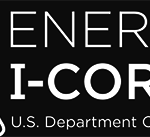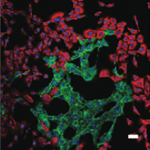Two teams of Biosciences Area researchers are representing Berkeley Lab as part of cohort eight of the U.S. Department of Energy’s I-Corps program, an intensive two-month training course that pairs national laboratory researchers with industry mentors to develop viable market pathways for their technologies. The teams, led by Deepti Tanjore and Esther Singer, presented their projects during the opening session held October 1–5 in Golden, Colorado.
Normal is Good: Breast Cells Produced in Novel Media Resemble Those In Vivo
When studying human cells in a laboratory, it is important that the media, or the broth that bathes the cells, contains all of the nutrients necessary to support cells through their normal growth and division phases even though they are outside of the body. Bioscientists at Berkeley Lab have a long history of studying breast cancer, and Martha Stampfer, senior scientist in the Biological Systems & Engineering (BSE) Division, has spent decades developing media now widely used by the community. Today, PLOS ONE published a study describing a comprehensive analysis of three kinds of media used to grow human mammary epithelial cells (HMEC).
JBEI Hosts Fossil-Based Resources, Refining, Fuels & Petrochemicals Technology Workshop
 On September 20-21, JBEI hosted an internal workshop that covered the fundamentals of the production of petroleum and natural gas and their refining and conversion to chemicals. The workshop leader was Dr. Paul Bryan, former Director of DOE’s Bioenergy Technology Office (BETO), and the former VP of Biofuels Technology and Founding Manager of the Alliance for Advanced Energy Solutions for Chevron.
On September 20-21, JBEI hosted an internal workshop that covered the fundamentals of the production of petroleum and natural gas and their refining and conversion to chemicals. The workshop leader was Dr. Paul Bryan, former Director of DOE’s Bioenergy Technology Office (BETO), and the former VP of Biofuels Technology and Founding Manager of the Alliance for Advanced Energy Solutions for Chevron.
Three Agile BioFoundry Bioenergy R&D Projects Receive DOE Awards
 Earlier this month the U.S. Department of Energy (DOE) announced the selection of 36 projects totaling $80 million to support early-stage bioenergy research and development (R&D), including three that will make use of DOE’s Agile BioFoundry expertise in the areas of advanced biomanufacturing and bioproducts.
Earlier this month the U.S. Department of Energy (DOE) announced the selection of 36 projects totaling $80 million to support early-stage bioenergy research and development (R&D), including three that will make use of DOE’s Agile BioFoundry expertise in the areas of advanced biomanufacturing and bioproducts.
This R&D will enable cost-competitive, drop-in renewable hydrocarbon fuels, bio-based products, and power from non-food biomass and waste feedstocks. The work supports the DOE’s goal of reducing the cost of bio-based drop-in fuels to $3/gallon by 2022 to continue to provide consumers with affordable, reliable transportation energy choices.
Biosciences Scientists Featured in The New Yorker
 Biosciences scientists Héctor García Martín, Jay Keasling, and Jill Banfield (whose primary affiliation is with the Earth & Environmental Sciences Area) were mentioned an article by Amia Srinivasan entitled “What Termites Can Teach Us” published in The New Yorker. Read the article.
Biosciences scientists Héctor García Martín, Jay Keasling, and Jill Banfield (whose primary affiliation is with the Earth & Environmental Sciences Area) were mentioned an article by Amia Srinivasan entitled “What Termites Can Teach Us” published in The New Yorker. Read the article.
- « Previous Page
- 1
- …
- 27
- 28
- 29
- 30
- 31
- …
- 62
- Next Page »
Was this page useful?





